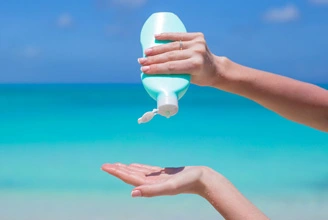Sun care is one of the fastest growing segments of the personal care market, and in addition to the need to protect yourself from the sun while on a beach vacation, UV protection is now used in many everyday cosmetic products such as facial skin care Skin and hair are protected from sun damage. In addition, these physical and chemical UV filters are used as stabilizers to protect the integrity of the finished product (color and aroma).
UV filters in cosmetics are generally divided into organic UV filters and inorganic UV filters. Organic UV filters are also known as chemical sunscreens. They can in principle be used in all sun/UV protection products, but may not be suitable for babies or products with sensitive skin due to possible allergic reactions in sensitive people.
Inorganic UV filters are also known as physical sunscreens. Inorganic UV filters are suitable for any application of UV protection other than clear formulations or aerosol sprays. They are especially suitable for baby sun protection products, sensitive skin products.
There are many combinations of UV filters in cosmetics that work synergistically. Good synergies are usually achieved through complementary actions, for example: combining oil-soluble (or oil-dispersible) filters with water-soluble (or water-dispersible) filters, combining UVA filters with UVB filters, combining inorganic UV filters with organic UV filters.
With over 30 years of experience in producing, selecting and blending physical and chemical UV filters, TINTOLL is able to formulate innovative sun protection solutions that meet consumer expectations.
TINTOLL provides high-efficiency sunscreen active ingredients for personal care formulations. By maximizing the efficacy of the UV filters in cosmetics used, a high SPF product can be produced with a minimum of physical and chemical UV filters.
UV filters in cosmetics are chemicals that absorb or reflect ultraviolet rays from sunlight or artificial light. They are types of polymer stabilizers used in cosmetics and personal care products to protect the skin from the harmful effects of UV rays, such as skin cancer, photodamage and wrinkles.
UV filters in cosmetics protect skin from UVA (315–400 nm) and UVB (280–315 nm) exposure. Each UV filter provides protection in a specific UV range.
The most commonly used commercially available physical and chemical UV filters are:
Octamethoxycinnamate
octyl dimethylaminobenzoate
p-aminobenzoic acid
p-Amyldimethyl-p-aminobenzoic acid (padimate-A)
2-Ethoxyethyl p-methoxycinnamate

Organic sunscreens are better for people with sensitive or allergy-prone skin.
Inorganic sunscreens are hypoallergenic and less likely to irritate the skin.

Chemical compositions provide more complete UV protection than physical compositions.
Inorganic sunscreens, however, are photostable and offer broad-spectrum protection.

These physical and chemical UV filters are more effective at resisting water and sweat. This makes them a better choice for swimming or physical activity in the sun.

Organic sunscreens are better because they biodegrade.

Inorganic sunscreens are safer for both skin and the environment. However, they may be harder to rub in and some options are pretty thick.
Selecting the right physical and chemical UV filters for skincare products involves understanding their characteristics, efficacy, and potential side effects. Here are some tips to guide you:
Consider Broad-Spectrum Protection: Look for products that offer broad-spectrum protection, meaning they shield against both UVA and UVB rays. Chemical filters often provide broader coverage compared to physical filters alone.
Understand Photostability: Some UV filters in cosmetics degrade upon exposure to sunlight, losing their effectiveness over time. Seek out filters with high photostability to ensure longer-lasting protection.
Check for Irritants: Some chemical filters may cause irritation or allergic reactions in sensitive individuals. Patch testing new products can help identify any adverse reactions.
Consider Skin Type and Tolerance: Physical filters like zinc oxide are generally well-tolerated by sensitive skin types, whereas some chemical filters may be more irritating. Individuals with sensitive skin may opt for physical filters or formulations designed for sensitive skin.
Water Resistance: If you'll be swimming or sweating, choose a sunscreen labeled as water-resistant. Both physical and chemical UV filters can provide water resistance, but formulations vary, so check product labels for specifics.